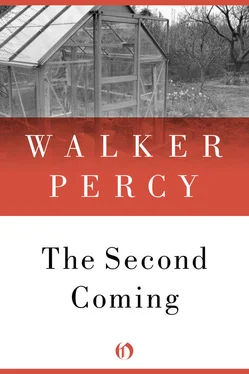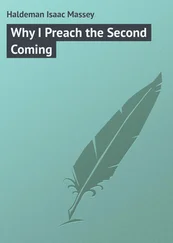Bertie’s note read:
Please call me, Willie. Urgent.
Leslie’s letter read:
Dearest Poppy:
Kitty just told me where you are. I did not want to wake you so I’m leaving this note for you, knowing you’re coming here.
I’ve forgiven you everything. I did not mind your doing your usual number and splitting for parts unknown before the wedding, but I admit it did hurt a little to learn you had spent the past week shacked up in the woods with a little forest sprite not two miles away. But we always can have the forgiveness of sins through the riches of his grace (Eph. 1:7). Anyhow, I acted like a pill myself.
But everything is different now! My joy is fulfilled (John 3:29).
Dr. Battle told me of your whereabouts during the past week. He felt consideration for your health outweighed doctor-patient confidence.
Jack Curl and Jason and I have some wonderful ideas for the love-and-faith community you and Jack are planning. What you and your little sprite do is your business, but before you make any radical decisions, lets sit down with Lewis and Jack and finalize the Marion Peabody Foundation, which was Mother’s dream.
We’ll be at Jack Curl’s house waiting for you. I laid out some clothes for you. Closed house. Will tell you more. Can’t wait to see ya.
Devotedly,
Yours in the Lord,
Leslie
Dearest? Ya? Devotedly? What’s cooking here, Leslie? The slanginess was not like her. The friendliness was ominous. The “devotedly” was somewhere north of love and south of sincerely. He liked her old sour self better.
What was she up to? He felt a faint prickle of interest under the unfamiliar cashmere of the cardigan. Dr. Marcus Welby chuckled and tapped out his empty pipe. Was she afraid he was going to marry Allie and blow the Peabody millions? Then what would happen to hers and Jack Curl’s love-and-faith community? Kelso would say they’re out to screw you. But Kelso was crazy. He shrugged. Did it matter?
He telephoned Bertie.
“Willie, I’m delighted heh heh,” said Bertie, coming as close as he could to a laugh, a hollow Hampton chortle, a whuffing sound. “Happy birthday.”
“What’s that?” he asked quickly. “Oh, yes. I forgot. Thank you.”
“This is not just your ordinary birthday,” said Bertie. Bertie’s horserace, he knew, would be slanted and keen about the nostrils.
“It isn’t?”
“Don’t you know what this means, Willie?” Bertie’s voice lowered. He sounded as if he were covering the receiver with both hands like a spy in a phone booth.
“No, what?”
“As of yesterday, you are eligible for the Seniors, a young fellow like you! They changed the rules last year.”
“The Seniors,” he said, musing.
“Yes. Your birthday was yesterday, which makes you eligible. First the tournament here this weekend. After that, the tour. We can do Hilton Head and Sea Island before Thanksgiving. Willie, we got them by the short and curlies heh heh hough.”
“We have?”
“Figure the arithmetic. You’re at least six strokes better than your new handicap of twelve which was posted last week and which was due to your slice which you can correct easily if you put your mind to it — you couldn’t have planned it better, in fact. I’m ten strokes better than my twenty-five — I sneaked out yesterday and carded a ninety-four. We’ll sandbag ever’ sucker between here and Augusta,” said Bertie, trying to talk Southern, but it still came out hollow-throat Hampton. “We’ll clean up on them.”
He couldn’t think of anything to say.
“Willie—”
“Yes.”
“Could we at least sign up for the Seniors here?”
“Why not?”
“I’ve been thinking about your slice.”
“Yes?”
“I think I can straighten you out. Okay?”
“Sure.”
“That’s my boy. No, seriously. In my opinion, and Lewis agrees, you haven’t begun to realize your potential. If you put your mind to it, you could knock off Snead and Hogan.”
An eighty-year-old Gene Sarazen. Why not?
Why not play golf with hale and ruddy Seniors for the next thirty years? He’d be the youngest on the tour, the Golden Bear among the old grizzlies.
When he drove the Mercedes back to town in the dark, a light flew behind the bushes at the corner of his eye as if a runner with a lantern were keeping pace. The road ran along the ridge, which fell away on both sides. He saw two roads instead of one, and thinking himself to be on an interstate, took the passing lane, until he saw headlights coming straight at him. He spun the wheel. As he was crossing the shoulder of the highway and the car which almost hit him was still blowing its horn in an outraged Doppler downbeat eeeoooo, he had time to wonder how shallow the ditch was and how steep the drop-off beyond it. Saplings lashed at the windows as if his car were still and a storm raged. The Mercedes, riding trees, airborne, rose and hit something hard but at an angle which bore him up even higher.
His head struck the windshield.
The car was propped at a queer angle. Though he had slid against the door and was comfortable enough, head propped against the post like a motorist taking a nap, he noticed that the window did not let onto leaves or earth as might be expected but deep empty dark. Perhaps it would be better to wait until daylight before climbing out, he thought, dozing. He thought about the Greener and the Luger he had locked in the trunk.
3
He was walking along the highway, hands in pockets. The November sun was warm on his back. Jewelweed still bloomed in the ditches. Bright yellow birds fluttered in the trees. Cars and trucks roared past him in a hurry to leave somewhere or arrive somewhere. The drivers gazed straight ahead, swerving only slightly to miss him. Their faces showed a strong sense of purpose. Most of the cars, he noticed, had North Carolina plates. North Carolina. What am I doing here? he wondered. A Mazda passed with a bumper sticker which read: YOUR GOD MAY BE DEAD BUT I TALKED TO MINE THIS MORNING.
Behind him the Mercedes was wedged securely in the crotch of a maple not high above a ravine. He had not been in danger. It was an easy matter to open a door on the high side, climb out, and drop the few feet to the soft earth.
When he thrust his hands in his pockets he found a roll of bills. He sat in the sunny dry ditch and counted them. Five hundred dollars in fifties. He smiled and nodded, put the money back in his pocket, and resumed walking. With one part of his mind he knew where the money came from. But if someone had asked him, he might not have been able to answer. Leslie has staked me, he said to himself. Leslie has a plan. He felt himself in good hands.
In the bus-station restaurant, he ate a breakfast of three fried eggs, a plate of grits and bacon, two pieces of buttered toast, and two cups of coffee. He felt fine but somewhat abstracted, like a man who is looking at something without seeing it yet cannot bring himself to tear his eyes away. A man sitting next to him at the counter began to speak to him and he nodded agreeably but didn’t listen. The man was talking about Georgia.
After he paid his check, he found a tall man walking beside him. The man was talking to him. It was the same man. He looked at him. Though the tall man stood reared back, feet apart, as if he had a big belly, he did not. Actually he was thin and seemed infirm. His rimless glasses flashed. His cheeks were pale and withered but his lips curved richly as if they belonged to a hearty man.
Now they were standing more or less in line at the ticket window. The tall man was explaining something. Suddenly he made a fist of one hand and thrust it into the other open hand and pushed with all his might. The man’s pale face grew red and his elbows trembled.
Читать дальше












